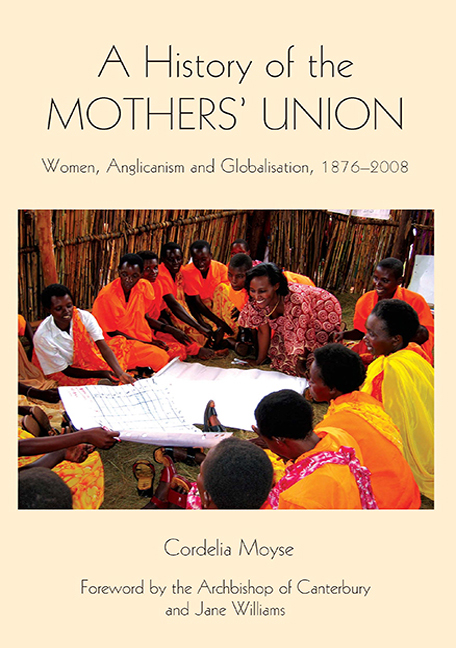Book contents
- Frontmatter
- Contents
- Dedication
- List of Illustrations
- Foreword by the Archbishop of Canterbury and Jane Williams
- Acknowledgements
- Abbreviations
- Introduction
- Part I 1876–1909
- Part II 1910–1944
- Part III 1945–1974
- 8 Identity and Spirituality
- 9 Marriage and Family Life
- 10 Membership and Worldwide Work
- Part IV 1975–2008
- Conclusion
- Appendix 1 Text of early membership cards
- Appendix 2 Development of the Mothers' Union prayer
- Appendix 3 Midday prayers (original)
- Appendix 4 Development of the objects
- Appendix 5 Biographical notes on central and worldwide presidents
- Bibliography
- Index
- Miscellaneous Endmatter
9 - Marriage and Family Life
from Part III - 1945–1974
Published online by Cambridge University Press: 29 April 2017
- Frontmatter
- Contents
- Dedication
- List of Illustrations
- Foreword by the Archbishop of Canterbury and Jane Williams
- Acknowledgements
- Abbreviations
- Introduction
- Part I 1876–1909
- Part II 1910–1944
- Part III 1945–1974
- 8 Identity and Spirituality
- 9 Marriage and Family Life
- 10 Membership and Worldwide Work
- Part IV 1975–2008
- Conclusion
- Appendix 1 Text of early membership cards
- Appendix 2 Development of the Mothers' Union prayer
- Appendix 3 Midday prayers (original)
- Appendix 4 Development of the objects
- Appendix 5 Biographical notes on central and worldwide presidents
- Bibliography
- Index
- Miscellaneous Endmatter
Summary
From the vantage point of 1944 it was not unreasonable for the MU leadership to have some confidence that its views on women, the family and on Christian faith in daily life were still widely shared and would inform public policy. The longing for an end to war was often fed by a desire for home and hearth with family members resuming their traditional gender roles. It was possible to see Christianity as standing at the heart of the nation's life. At an ideological level the Second World War had been seen as moral struggle between ‘Christian’ civilisation and the ‘pagan’ Nazis. Evidence of Christianity's central place in the moral formation of the nation is seen in 1944 when, for the first time, religious education in state schools as well as a daily act of worship was made compulsory in England and Wales. The Church of England in particular enjoyed an association with the plans for post-war creation of the welfare state, the very term being coined by Archbishop William Temple. One might therefore have assumed that an organisation like the MU, dedicated to upholding women as the embodiment of spiritual and moral values in the home and committed to supporting the vocations of motherhood and lifelong marriage, would have had some influence on future social policy. Yet public support for the maintenance or re-establishment of familial ideals held by the MU (and challenged in the 1930s) was not achievable in peacetime. Politically, economically, socially and morally a widening gulf separated pre-war and post-war Britain, making the former another country.
In the 1950s the MU's understanding of marriage and the role of mothers began to come under pressure from economic and social developments, despite that decade's often comfortable conservatism. What was experienced in the 1950s as a series of challenges to its mission, coalesced into an all-out assault on the values of the MU in the 1960s. Science, social reform and the adoption of a libertarian gospel by many within and outside the Church broke apart the holistic trinity of sex, marriage and reproduction which informed the MU's understanding of Christian marriage and family life. In the debates over the provision of divorce, birth control and abortion, ideas of personal autonomy and individual conscience trumped traditional sources of morality, not least the authority of parents.
- Type
- Chapter
- Information
- A History of the Mothers' UnionWomen, Anglicanism and Globalisation, 1876–2008, pp. 187 - 201Publisher: Boydell & BrewerPrint publication year: 2009



